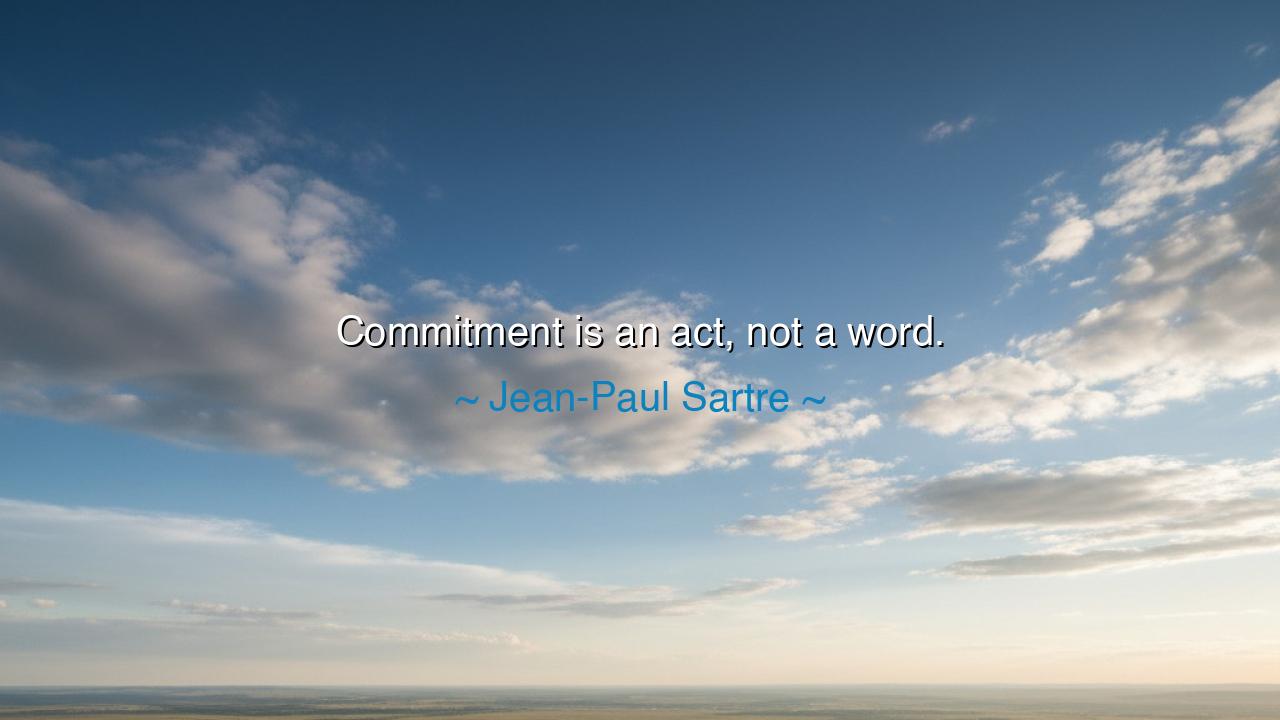
Commitment is an act, not a word.






The words of Jean-Paul Sartre, “Commitment is an act, not a word,” resound like a hammer striking stone. They remind us that true commitment cannot live in speech alone, for words are but shadows unless they are clothed in action. To pledge loyalty, to declare faith, to promise love—these mean nothing unless proven by the deeds of the hand and the endurance of the heart. For commitment is not the sound upon the air, but the step taken, the sacrifice made, the burden carried.
The ancients knew this truth with clarity. In Sparta, oaths were worthless unless lived out on the battlefield. The Greeks despised empty rhetoric, calling such men hollow, for they believed that virtue was proven in struggle, not in talk. Likewise, in Rome, the word fides—faithfulness—was sacred, but it was measured not in speeches, but in the steadfast loyalty of soldiers, friends, and statesmen. Thus Sartre echoes their wisdom: that a man is not defined by what he says, but by what he does.
History provides shining testimony. Consider Mahatma Gandhi, who spoke of nonviolence, yet proved it by living it with every breath—accepting prison, enduring beatings, and fasting for peace. His commitment to truth and justice was not an abstraction but an act, repeated again and again, until his life itself became the argument. In him we see Sartre’s principle embodied: words may inspire, but only actions transform.
Sartre’s words also stand as a warning. Many proclaim commitment to noble causes, but when trials come, they vanish like mist before the sun. Empty vows deceive others for a moment, but they corrode the soul of the speaker, leaving him diminished. To utter promises without the will to act is to profane the sacred bond of trust. Only through action does one’s word gain weight, and only through endurance does one’s loyalty shine true.
Let the generations remember this: commitment is not written in ink or carved in stone, but in the living choices of each day. It is the soldier who stands his ground when retreat beckons, the friend who remains when fortune fades, the lover who endures when storms arise. Words may open the gate, but only action builds the road. For truly, commitment is an act, not a word, and he who lives by this truth will leave behind a legacy that endures long after his voice is silent.






LMLong Minh
In workplaces, many leaders pledge priorities—wellbeing, inclusion, sustainability—but credibility shows up in calendars, budgets, and trade-offs. What diagnostic questions reveal whether those commitments are operationalized? For example: Who gets promoted and why? What projects are paused to fund the stated value? Which metrics appear on quarterly reviews? I’d love a concrete audit template that translates ideals into resourcing tests, with red flags for lip service and green flags for realignment, so employees can discern substance from branding.
CBNguyen Cong Binh
Philosophically, it sounds like a rebuke to self-deception. If identity emerges from choices enacted, then self-descriptions without practice are just costumes. Yet I wonder about forms of restraint: refusing a harmful shortcut, keeping a confidence, pausing before speaking—aren’t those actions too, even when they look like inaction? How should we weigh intention, context, and consequence when an ethical stand is essentially a refusal? I’d appreciate a framework that honors quiet integrity alongside more visible forms of doing.
T7Thuy Tien 7/10
Applied to civic life, it challenges symbolic gestures. Posting, branding, and slogans can raise awareness, but where is the threshold where contribution changes conditions—volunteering hours, donating consistently, learning policy, showing up for tedious meetings? I’m curious how to prevent a purity spiral where only maximal sacrifice counts, which can freeze people out. Could we map tiers of involvement that acknowledge constraints while still privileging concrete impact? And how do we maintain momentum after the initial urgency fades?
PQLe Ngoc Phuong Quyen
In relationships, this feels both comforting and scary. Affection can be spoken in grand declarations, yet trust grows from small, reliable deeds: showing up on rough days, remembering details, repairing after conflict. My worry is burnout—can someone over-index on doing to prove loyalty and lose their own boundaries? What signs distinguish healthy follow-through from scorekeeping or martyrdom? I’d love guidance on calibrating steady care with sustainable limits, so that action deepens connection without turning love into a ledger.
MPDO NG MAI PHUONG
This line pushes me to think about the gap between pledges and patterns. If sincerity is measured by repeated behavior, what practical yardsticks would you use to test whether a promise is real? Deadlines hit, mornings started earlier, money reallocated, habits tracked? I’m intrigued by the idea of designing rituals—weekly check-ins, public dashboards, accountability partners—that convert intentions into muscle memory. But how do you keep those structures from becoming performative checklists rather than transformative practices when boredom and setbacks arrive?